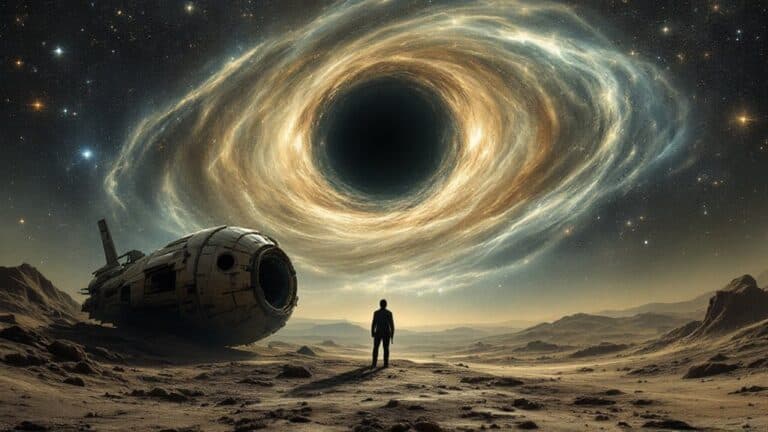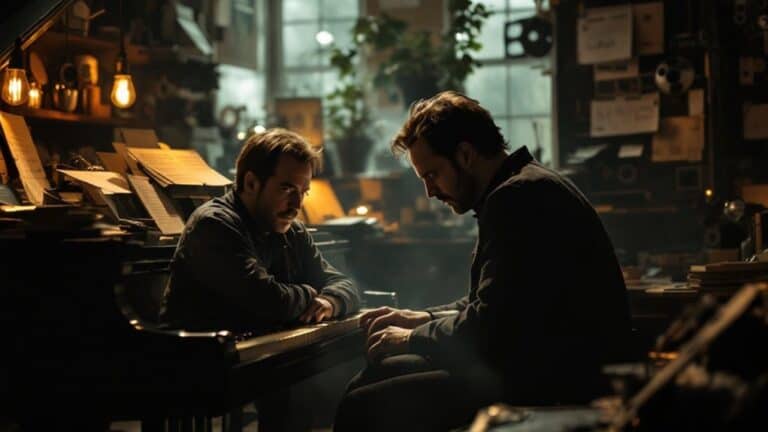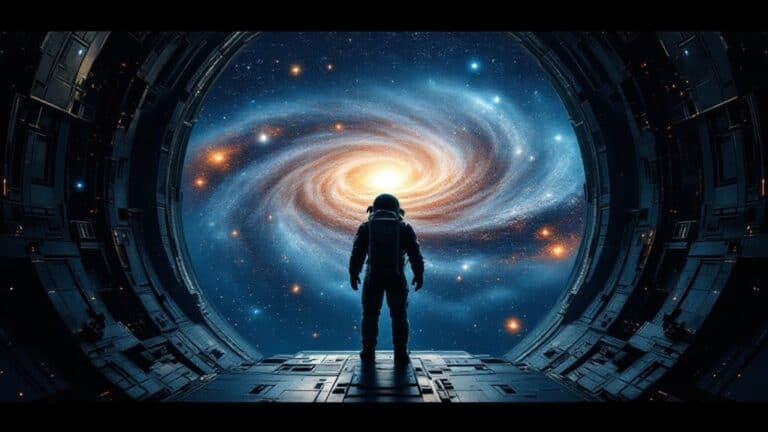The Moral Dilemmas of Time Travel in Interstellar
In “Interstellar,” time travel intricately weaves together moral dilemmas that challenge your understanding of choice and consequence. As Cooper sacrifices himself, you feel the emotional weight of his decisions ripple through time, affecting Murph and the future of humanity. The film raises ethical questions about colonization and the disruption of ecosystems, forcing you to confront humanity’s right to claim new worlds. Characters grapple with isolation and survival instincts, complicating their moral obligations. This time-warped narrative not only highlights personal relationships but also prompts you to reflect on the nature of morality in an intricate, multidimensional universe. There’s more to contemplate as these themes unfold.
Table of Contents
Key Takeaways
- The necessity of survival leads to moral justifications for time travel, challenging ethical frameworks surrounding humanity’s right to alter the past.
- Temporal paradoxes complicate morality, forcing characters to weigh personal sacrifices against the greater good of humanity’s future.
- Communication with the past raises ethical dilemmas, as characters must consider the implications of their actions on both individual lives and collective survival.
- The emotional impact of time dilation creates conflicts, as characters grapple with the consequences of their decisions on relationships and personal sacrifices.
- The manipulation of time forces a reevaluation of moral obligations, blurring the line between right and wrong in high-stakes scenarios.
Choices and Consequences
In “Interstellar,” the choices characters make lead to profound consequences that ripple through time and relationships. You witness how sacrificial choices shape destinies. Cooper’s decision to leave his family behind to save humanity isn’t just a personal loss; it’s a heartbreaking sacrifice that underscores the weight of his mission.
As he ventures into the unknown, you can’t help but feel the emotional toll. The time manipulation experienced on Miller’s planet creates a stark reality where every hour spent translates to seven years lost on Earth, intensifying these sacrifices and complicating connections with loved ones. This theme of individual sacrifice resonates throughout the film, particularly as Murph struggles with the emotional cost of their survival efforts. Additionally, Cooper’s choice becomes even more significant when you consider the implications of Plan A, as the success of his mission could determine the fate of humanity.
Moreover, the crew’s journey reveals that time isn’t just a linear path; it’s a malleable force, twisted by gravity and urgency. As Cooper navigates the tesseract—a construct of future humans—you see how past actions ripple into the present. This is particularly evident in how Cooper’s actions affect Murph’s ability to solve the equation that underpins Plan A a critical mission objective, reminding you that choices are never isolated events.
They intertwine with the lives of those left behind, echoing through time. This intricate dance of time and consequence challenges you to reflect on your own decisions, urging you to contemplate how your choices might reverberate far beyond what you can see in the moment.
Ethical Dilemmas in Colonization

When you consider colonization, you might wrestle with the moral justifications behind it, especially regarding the intrinsic value of human life versus the potential disruption of alien ecosystems.
It’s crucial to reflect on whether humanity has the right to claim new worlds, particularly if they harbor life forms that deserve protection.
As we explore the ethical landscape of colonization, you’ll find yourself questioning not just our responsibilities to these new environments, but also the implications of repeating history’s mistakes in our pursuit of progress. Recent technological advances have made the idea of settling other planets more feasible, further complicating these ethical considerations. The integration of multidisciplinary fields in space colonization highlights the complexity of these moral dilemmas.
Colonization’s Moral Justifications
Justifying colonization raises significant moral dilemmas that challenge our ethical frameworks. You might feel a profound sense of responsibility when considering the survival of humanity. With overpopulation and dwindling resources threatening our existence, some argue that colonization becomes a moral obligation. This perspective values human life above potential extraterrestrial life, framing our expansion into the cosmos as necessary for survival.
However, this approach raises critical ethical questions. Should we prioritize our species at the cost of disrupting alien ecosystems? The Prime Directive in *Star Trek* emphasizes non-interference, urging us to respect the natural development of other life forms. You may wonder whether we can reconcile our desire for survival with a commitment to ethical stewardship and cultural sensitivity. Moreover, colonization of a dead world poses fewer ethical concerns than one with intelligent life, complicating our mission as we navigate these moral landscapes.
As you reflect on these dilemmas, remember that colonization isn’t just about finding new homes; it’s about how we engage with the universe and its myriad forms of life. The ethical frameworks guiding us should promote harmonious coexistence, allowing us to explore responsibly while honoring the value of all life.
Ultimately, you must confront the long-term consequences of our actions and the moral obligations that accompany them, fostering a deeper connection to both our planet and beyond.
Alien Ecosystem Considerations
As humanity reaches outward to explore and potentially colonize alien worlds, the ethical dilemmas surrounding alien ecosystems come to the forefront. You might wonder what responsibilities we carry when we step into these uncharted territories. The preservation of life, even at the microbial level, is a moral obligation that demands our attention.
- Microbial preservation is crucial for maintaining balance.
- We need to respect alien autonomy in ecosystems.
- The environmental impact of colonization can be devastating, as the industrialization’s environmental havoc raises questions about terraforming. This concern echoes the film’s critique of humanity’s tendency to exploit resources until depletion, highlighting the importance of sustainable practices. Moreover, the film suggests that human behavior will lead to resource depletion on new planets, mirroring past mistakes.
- Long-term consequences may mirror Earth’s past mistakes.
- Ethical stewardship must guide our exploration efforts.
In considering these factors, it’s clear that colonization isn’t just about resource acquisition; it’s about understanding and respecting the intricate web of life that exists beyond our planet.
We must embrace a non-interference principle, ensuring we don’t disrupt natural processes or impose our will on alien life forms. The stakes are high, and the ethical implications are profound.
Conflicts in Character Decisions
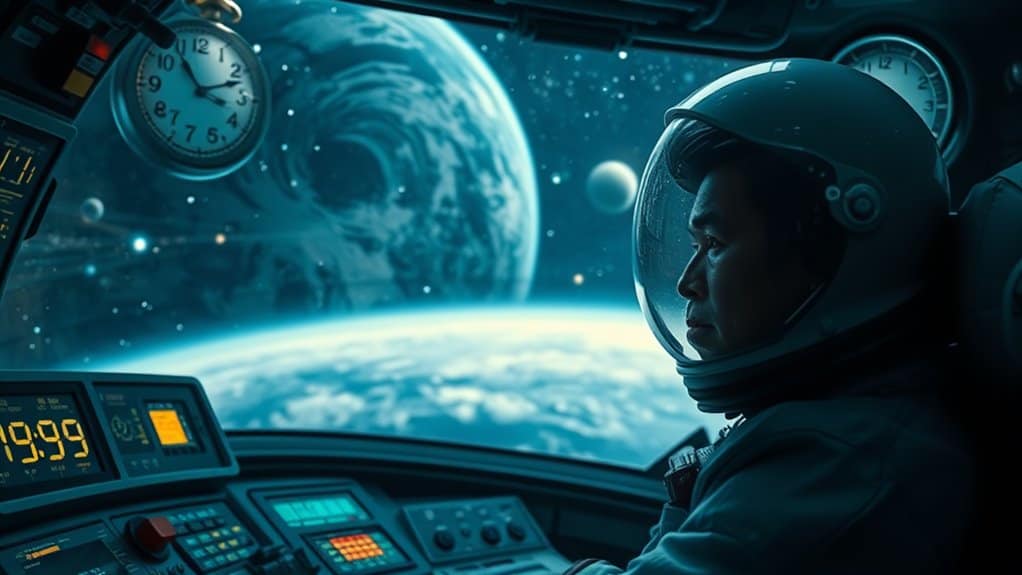
Conflicts in character decisions drive the emotional core of *Interstellar*, revealing the complexities of human nature under extreme circumstances. You see Cooper’s choice to leave Earth as an act of sacrifice, driven by his sense of responsibility to humanity’s future. Yet, this decision fractures his relationship with Murph, highlighting the painful decision consequences that ripple through their lives.
Meanwhile, Dr. Mann’s desperate deception reflects a stark contrast; he prioritizes his survival over the mission’s success, leading to a betrayal that underscores the darker aspects of character motivations. His selfishness ultimately results in his downfall, emphasizing how isolation can warp one’s morals. Dr. Mann’s actions also illustrate the potential for human behavior to deteriorate under extreme pressure, demonstrating how isolation can lead to moral collapse. The consequences of Cooper’s communication with Murphy across time exemplify how the emotional ties between loved ones can transcend even the most challenging circumstances.
Dr. Brand’s choice to conceal the truth about Earth’s evacuation adds another layer of complexity. He believes maintaining hope is essential, yet it raises unsettling questions about the balance between collective well-being and individual rights. This dilemma is further complicated by the fact that the mission’s success hinges on the need for human exploration beyond Earth.
Murph’s emotional journey, marked by anger and eventual understanding, serves as a poignant reminder of the personal costs tied to these monumental decisions. Each character’s struggle reveals how the weight of their choices defines not only their destinies but also the fragile connections that bind them.
In this intricate web of decisions, the exploration of human nature becomes profoundly relatable.
Time Travel and Its Implications
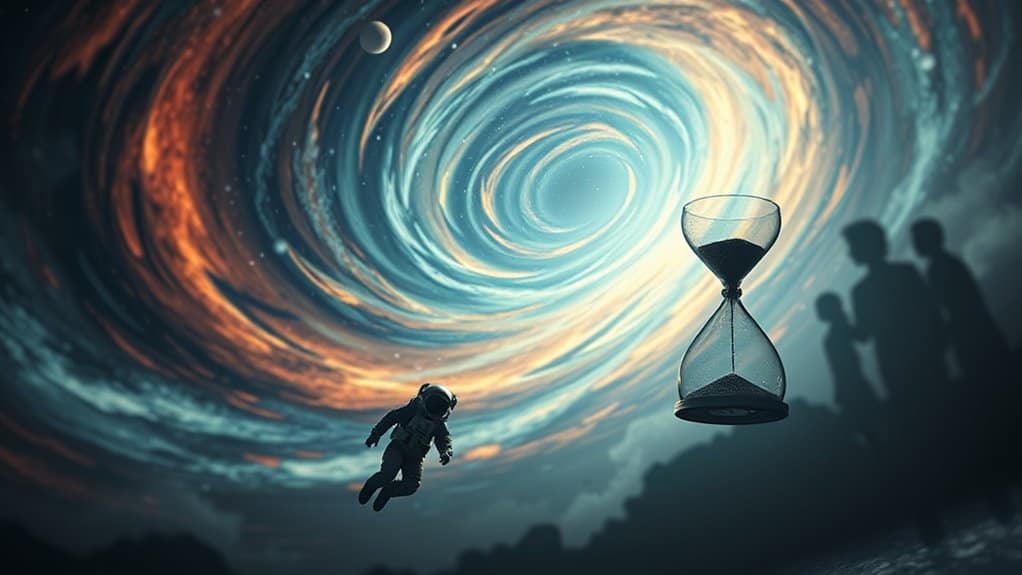
Time travel in *Interstellar* brings with it a web of implications that challenge our understanding of reality and morality. The film explores complex concepts like temporal paradoxes and their ethical implications, making you rethink what it means to alter time.
- The experience of time dilation near massive objects.
- The moral dilemmas of communicating with the past.
- The influence of causality on choices made today.
- The struggle between individual lives versus humanity’s survival.
- The long-term consequences of our actions across time.
As you investigate these themes, consider how each choice ripples through time. When Cooper sends data back to Murphy, he not only alters her fate but also raises questions about free will and determinism. The extreme time dilation experienced on Miller’s Planet underscores the profound disconnect between individual experiences and the broader implications for humanity’s survival. The existence of potentially habitable planets within our galaxy suggests that humanity’s fate may not rest solely on individual actions but also on our collective ability to explore and adapt. This exploration of moral obligations highlights the tension between the needs of the present and the sacrifices made for future generations.
Are our futures set, or can we reshape them through our actions? The ethical implications of survival weigh heavily, forcing you to question the value of individual lives against the greater good.
In traversing these temporal paradoxes, Interstellar invites you to reflect on the profound responsibility that comes with the power to change the past, urging a deeper understanding of the human condition and our moral compass in the face of cosmic challenges.
Human Nature and Survival Instincts

When you think about survival instincts, you realize they often shape your choices in profound ways, especially when faced with moral dilemmas.
Human nature pulls you in two directions: the instinct to protect yourself and your loved ones collides with the ethical implications of your decisions, creating a complex web of emotional bonds that can influence your actions.
In moments of crisis, these instincts can lead to choices that prioritize immediate survival over long-term consequences, prompting you to reflect on what it truly means to be human.
Survival Instincts Drive Choices
Survival instincts are powerful forces that shape our choices in high-stakes situations, often pushing personal needs to the forefront. In extreme environments, you might find yourself grappling with instinctual responses that prioritize your survival over collective goals. This struggle is rooted in survival psychology, revealing core aspects of human nature.
Consider the following:
- Conflict Between Personal Survival and Collective Goals
- Biological Imperatives of Self-Preservation
- High-Stakes Decision Making
- Impact of Isolation on Choices
- Rationalizing Self-Preservation Actions
When faced with imminent danger, you may instinctively prioritize your safety, sometimes at the expense of others. This drive, while fundamentally human, can lead to complex moral dilemmas, especially as isolation amplifies these instincts.
You might even justify decisions that serve your survival, viewing them as necessary, despite broader ethical implications.
In narratives like *Interstellar*, these survival instincts challenge characters, revealing the depths of human nature in the face of adversity.
Reflecting on your decisions in high-stakes scenarios can deepen your understanding of not just survival, but also the connections that bind you to others, making your choices all the more significant.
Human Nature’s Ethical Conflict
The tension between personal instincts and moral obligations becomes increasingly apparent in high-stakes scenarios, especially within the framework of time travel in *Interstellar*. You witness characters grappling with their ethical responsibilities, caught between the pull of personal sacrifice and the weight of humanity’s future.
Dr. Brand prioritizes the survival of humankind, often at the expense of immediate moral duties, while Cooper faces the heart-wrenching choice between his mission and his family’s well-being. This conflict illuminates the complexity of human nature, revealing how survival instincts can clash with our ethical standards.
The film’s non-linear storytelling emphasizes how time influences these moral dilemmas. As time stretches and compresses, you see characters forced to confront decisions that challenge their motivations and values.
Cooper’s desperation to save his family highlights the tension between personal desires and broader obligations. Ultimately, *Interstellar* serves as a mirror, reflecting the ethical conflicts inherent in human nature, where the quest for survival can lead to difficult sacrifices.
It compels you to ponder: what lengths would you go to for the greater good, and how do your personal instincts shape your moral compass in moments of crisis?
Emotional Bonds and Decisions
Emotional bonds drive crucial decisions in *Interstellar*, particularly through the poignant relationship between Cooper and his daughter Murphy. Their connection highlights how love transcends time and space, revealing the depth of human emotion amid the chaos of survival. Cooper’s emotional sacrifice, leaving his family to initiate a mission to save humanity, illustrates the complexities of these bonds.
- Love fuels the crew’s determination.
- Emotional sacrifice becomes a necessity.
- The desire for belonging influences choices.
- Dr. Brand emphasizes love’s timeless nature.
- Survival instincts challenge ethical boundaries.
As Cooper faces unimaginable challenges, his unwavering love for Murphy becomes a beacon guiding his actions. This love not only drives him to make heart-wrenching decisions but also emphasizes the instinctual need to protect one’s family.
The film masterfully portrays how these emotional ties can conflict with the harsh realities of survival, creating a profound tension that resonates with viewers. Ultimately, Interstellar invites you to reflect on the delicate balance between personal bonds and the greater good, questioning what lengths you’d go to in pursuit of love and survival.
It’s a reminder that while the universe may be vast, our emotional connections are what truly anchor us.
Philosophical Questions Raised
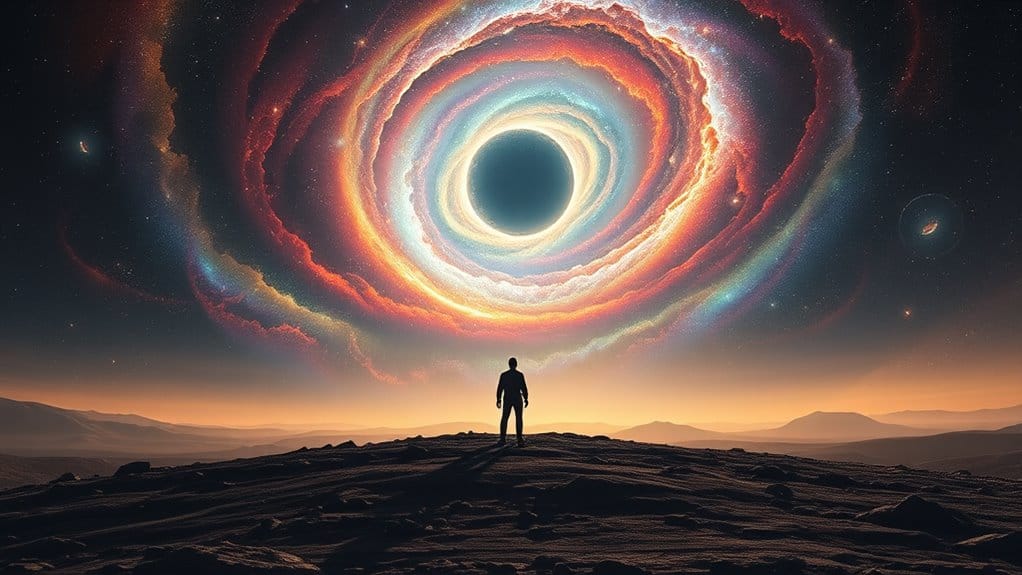
Many philosophical questions arise when considering the nature of time travel, especially in the context of *Interstellar*. You might find yourself pondering the illusion of linear time, realizing that it can be perceived as a complex, multidimensional construct. This shifts your understanding of causality, where actions from the future can influence the past, challenging your grasp of cause and effect.
The bootstrap paradox exemplifies this, suggesting that events can exist simultaneously across different time frames, forcing you to confront the implications of moral relativism in decision-making.
As the characters navigate their dilemmas, you may wonder about the ethical stewardship required in their quest for humanity’s survival. In contemplating the Trolley Dilemma, you recognize the weight of choosing collective well-being over individual lives. These scenarios compel you to reevaluate your own moral obligations, especially as parental duties come into play against the backdrop of a universal crisis.
Ultimately, *Interstellar* invites you to reflect on how temporal perception shapes your ethical framework, urging a deeper understanding of the moral complexities intertwined with the journey through time and space.
Emotional Impact of Decisions
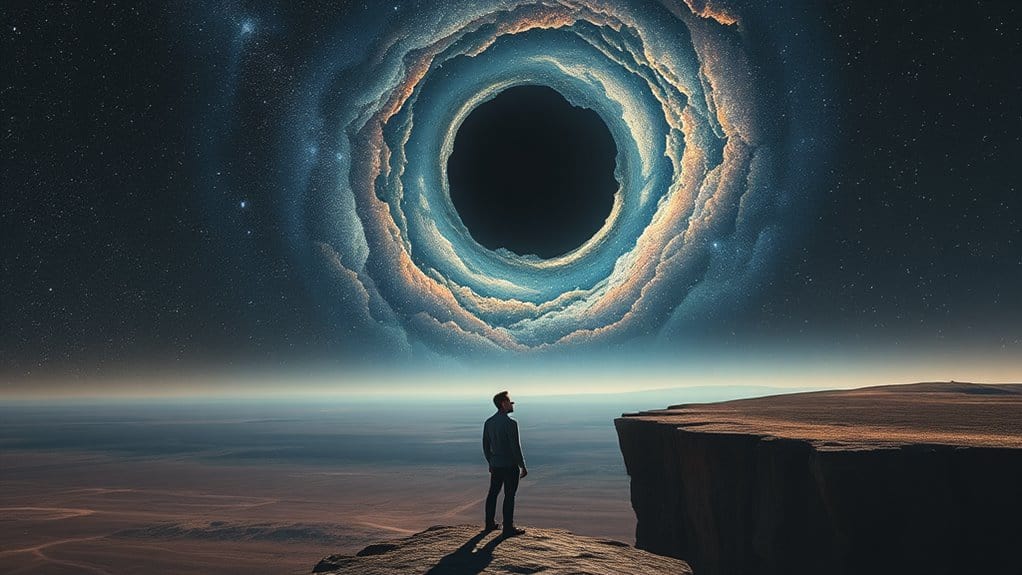
Traversing the emotional landscape of *Interstellar* reveals how decisions shaped by time distortion can profoundly affect relationships. The film illustrates that emotional sacrifices often accompany high-stakes choices, especially when time itself warps our perceptions of reality. You witness how love and grief intertwine, affecting characters’ motivations and decisions.
- Time dilation creates a 7-year gap for every hour on Miller’s planet.
- Cooper’s brief absence leads to nearly 23 years passing for Romily on the ship.
- Murph ages from child to elderly while Cooper remains youthful.
- Hathaway’s emotional connection influences the decision to visit Edmunds’ planet.
- Cooper’s choice to leave his children behind weighs heavily on his heart.
This emotional sacrifice resonates deeply, reminding you that even in the direst circumstances, personal feelings guide decisions. The film emphasizes that emotional connections can transcend the bounds of time, leading to reconciliation and redemption.
As Cooper seeks to understand his daughter, their bond ultimately shapes the narrative, showcasing the profound impact of choices made in the name of love. In this universe of time distortion, it becomes clear: every decision carries emotional weight, echoing through the lives of those left behind.
Conclusion
In “Interstellar,” the moral dilemmas of time travel force you to confront the weight of your choices, echoing the adage, “With great power comes great responsibility.” Each character’s decision impacts not only their lives but also the fate of humanity. As you navigate the complex interplay between survival instincts and ethical considerations, you realize that the essence of being human lies in these profound choices, shaping both your journey and the legacy you leave behind.


